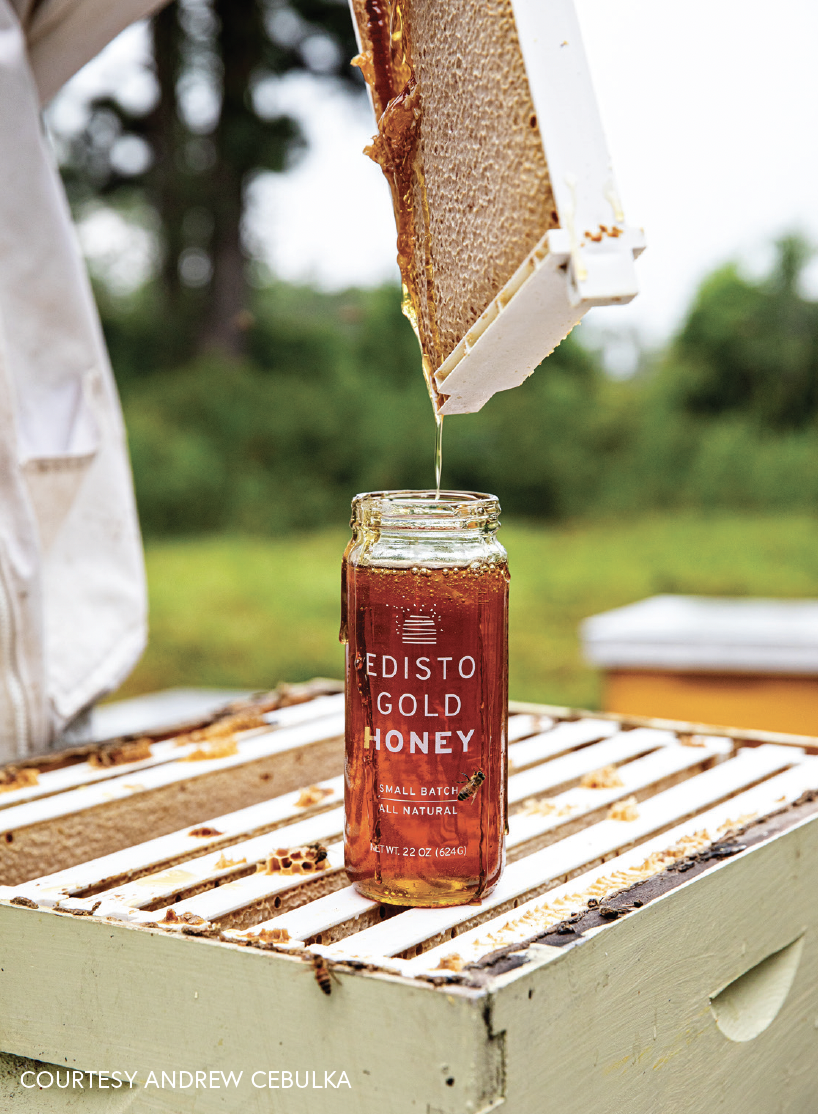Around Town: Edisto Gold Honey’s Sweet Intentions
by Pamela Jouan
Mark Connelly is the kind of guy who doesn’t sit still for long. A full-time firefighter for Dorchester County, he spends his “off” days wrangling bees, bottling honey, and delivering jars of Edisto Gold Honey to shops across South Carolina. His days are long, his commitments many, but his work—whether saving lives or nurturing hives—has always been about service.
Raised in the foothills of North Carolina, Connelly’s beekeeping journey began when his nature-loving mother inherited four hives from a retiring beekeeper. “She didn’t know anything about bees, but she went to the library and read every book she could,” Connelly recalls. “My brother and I got roped in to helping carry the heavy boxes and spinning the honey by hand when we were teenagers.” What began as summer chores soon turned into a lifelong calling, with Connelly absorbing wisdom from old-timers at monthly beekeeping classes and building his first business—Brothers Bees—while still in high school.
Years later, after earning a civil engineering degree from The Citadel and working in law enforcement, Connelly returned to his roots, founding Edisto Gold Honey in 2019 at the height of the pandemic. “It was a tough time to launch a product—no one wanted to talk face to face—but demand for immunity-boosting foods like honey was high,” he says. That helped get it off the ground.
Today, Edisto Gold is available in stores statewide and through distributors like GrowFood Carolina and Charleston Specialty Foods. But Connelly isn’t one to rest on a buzz-worthy reputation. This fall, he launched a new elderberry-infused honey, just in time for back-to-school season. “It’s the ultimate double-dose of immunity booster”—local honey combined with antioxidant-rich elderberries. Something that tastes good and that parents can feel good about giving their kids.
While the products are sweet, the mission runs deeper. From firefighting to beekeeping, every hat Connelly wears is worn with purpose. He’s deeply involved in pollination efforts across the Lowcountry, helping farmers increase crop yields naturally by deploying his bee colonies during their growing seasons, and is eager to continue to grow this arm of his business. “One third of the world’s food crops need pollinators—of which honeybees are one of many—to produce a harvest,” he explains. That translates into one out of every three bites of food you eat!
“One box of bees equals about 50,000 bees. As more flowers get fertilized and more pollen gets spread around, not only are you going to produce a bigger crop, but a better one too.” He points to a farm in Beaufort that grows watermelon, squash, and tomatoes. “Whenever the farmer adds in bees, he gets a bumper crop.” It’s true even of crops that self-pollinate, like strawberries. Bees help drive optimal fruit production. “It’s an investment with a big return.” And it helps keep the whole system humming.
That system, however, is under attack. “Pesticide use, climate change, all these crazy weather patterns have had a big impact on the bees and their ecosystem. Scorching South Carolina summers create what beekeepers call a “dearth,” a period when nectar is scarce, and hives rely on their spring honey reserves to survive. Add in mites that get stronger as the bees get weaker and it’s easy to see how many beekeepers lose their hives in the summer.”
The seasonal rhythms of the hive have become second nature to Connelly. He brightens as he talks about the “fall flow” of nectar that arrives as the goldenrod and ragweed bloom. “After the hive plateaus from the summer heat, the second flow of honey happens in the fall. The hive is busy again. The queen starts producing fat-bodied bees that can survive the winter,” he says. “When the weather drops below the 50s, they huddle around the queen, taking turns keeping each other warm—it’s this amazing, collective effort.” It’s hard not to draw a parallel between that instinctive teamwork and Connelly’s own approach to his community.
That sentiment is the soul of Edisto Gold Honey—pure, unprocessed, and full of purpose. Whether it’s a sweet way to start the school day, stirred into tea, or added to any meal, each jar tells a story not just of bees and blossoms, but of the man behind the hive: thoughtful, hard-working, and committed to making a difference, one sweet drop at a time.

